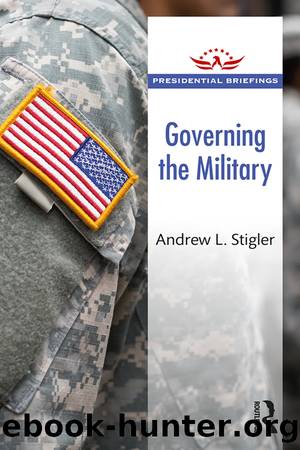Governing the Military by Andrew L Stigler

Author:Andrew L Stigler [Stigler, Andrew L]
Language: eng
Format: epub
Tags: Political Science, General
ISBN: 9781138489783
Google: fQxjDwAAQBAJ
Goodreads: 39227328
Publisher: Routledge
Published: 2018-07-05T00:00:00+00:00
The Cuban Missile Crisis
In October 1962, The United States and the USSR found themselves at the brink of a potentially apocalyptic confrontation. In defiance of multiple American warnings not to place offensive missiles in Cuba, Khrushchev decided to deploy surface-to-surface nuclear weapons and antiaircraft defenses in Cuba in May 1962. He was motivated, in part, by a recognition of the USSRâs inferior ability to strike the United States from Soviet territory. At the time, the Soviets had only twenty inter-continental ballistic missiles (ICBMs) capable of striking the United States. Deploying Soviet medium-range missiles to Cuba was seen as an inexpensive way of countering American superiority in strategic warheads. Khrushchev had hoped the missiles could be deployed and prepared in secret, but intelligence reports and U-2 aerial surveillance photography revealed indications of the Soviet operation before the missiles were ready for use.
Estimates of the number of people who could have been killed in a nuclear exchange between the two superpowers ran as high as two hundred million people. Once the crisis had been resolved, President John F. Kennedy privately estimated that the chance of a nuclear exchange was perhaps as high as 50%. Of course, Kennedyâs estimate was not a scientific estimation of the true probability of a nuclear exchange between the two superpowers during those days in October. Nevertheless, given that Kennedy was one of the two key decision-makers involved in the crisis and was as well-informed as the entire Executive Branch apparatus could make him, his assessment carries weight. Kennedy and Khrushchev both were simultaneously horrified at the prospect of nuclear war and understood the need to project a willingness to risk vast destruction in order to obtain bargaining leverage.
For the purposes of explaining how the militaryâs organizational culture can influence crisis deliberations, the Cuban Missile Crisis offers a number of examples of how organizational behavior affected the development of policy and the conduct of diplomacy with the Soviet Union. Specifically, there were a number of instances where the militaryâs actions or organizational behavior operated contrary to Kennedyâs will. Political scientists sometimes define this as irrational behaviorâhow the actions of a small part of a government can act contrary to the rational policy that the executive has selected. Three such examples are explored below.
One example involved Americaâs nuclear alert posture which was signaled by a sequence of Defense Conditions, or DEFCONs. These Defense Conditions, created in October 1959, instructed U.S. forces worldwide on their designated state of combat readiness. The DEFCONs ranged from 1 to 5, with 1 indicating that all-out war was imminent.
On 24 October 1962, General Thomas Power, the Commander in Chief of Strategic Air Command, ordered the alert status raised from DEFCON 3 to DEFCON 2. Furthermore, he ordered that this instruction be sent uncoded or âin the clear,â in order to be certain that the Soviets received an unmistakable signal that the United States had raised its alert status to a point just short of what would initiate a nuclear exchange. Here, then, is an
Download
This site does not store any files on its server. We only index and link to content provided by other sites. Please contact the content providers to delete copyright contents if any and email us, we'll remove relevant links or contents immediately.
| Automotive | Engineering |
| Transportation |
Machine Learning at Scale with H2O by Gregory Keys | David Whiting(4313)
Never by Ken Follett(3957)
Urban Outlaw by Magnus Walker(3400)
OPNsense Beginner to Professional by Julio Cesar Bueno de Camargo(3289)
Sapiens and Homo Deus by Yuval Noah Harari(3072)
Will by Will Smith(2920)
A Short History of Nearly Everything by Bryson Bill(2698)
Hooked: A Dark, Contemporary Romance (Never After Series) by Emily McIntire(2555)
Rationality by Steven Pinker(2366)
Borders by unknow(2315)
The Becoming by Nora Roberts(2204)
Holy Bible (NIV) by Zondervan(2125)
A Short History of War by Jeremy Black(1848)
HBR's 10 Must Reads 2022 by Harvard Business Review(1845)
The One Percenter Encyclopedia by Bill Hayes(1827)
Freedom by Sonny Barger(1801)
Go Tell the Bees That I Am Gone by Diana Gabaldon(1758)
A Game of Thrones (The Illustrated Edition) by George R. R. Martin(1746)
Five Ways to Fall by K.A. Tucker(1744)
